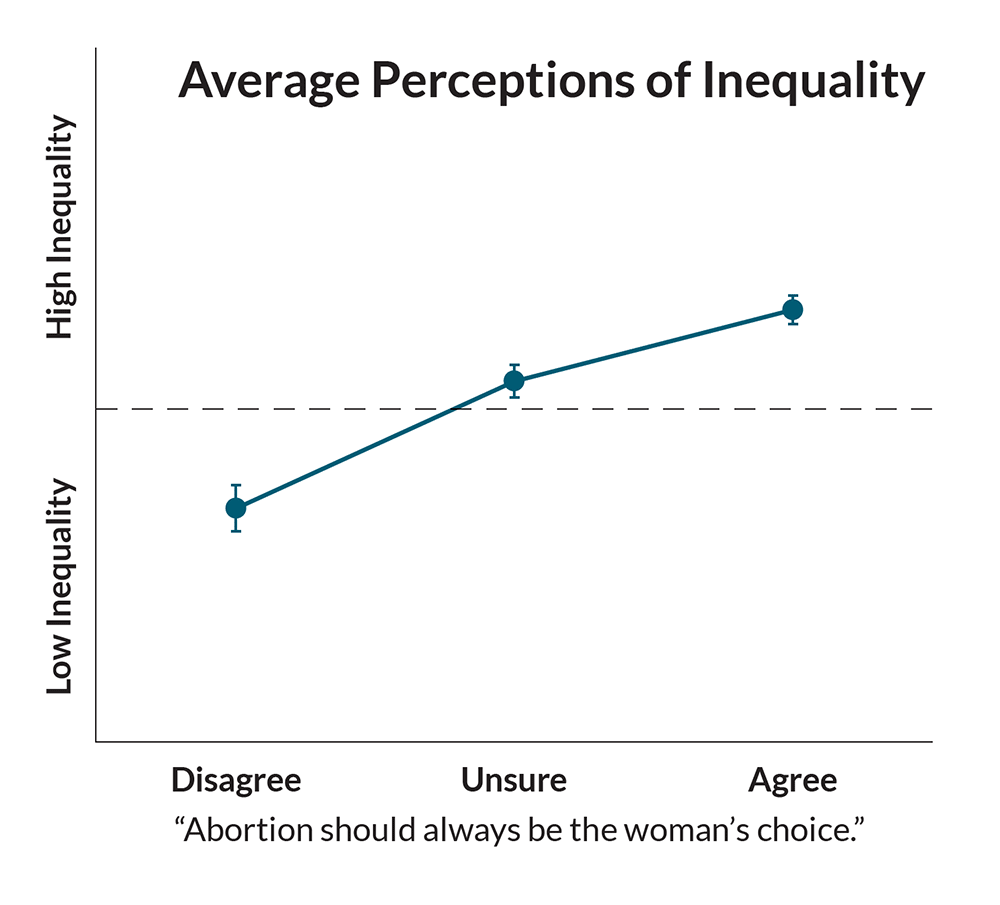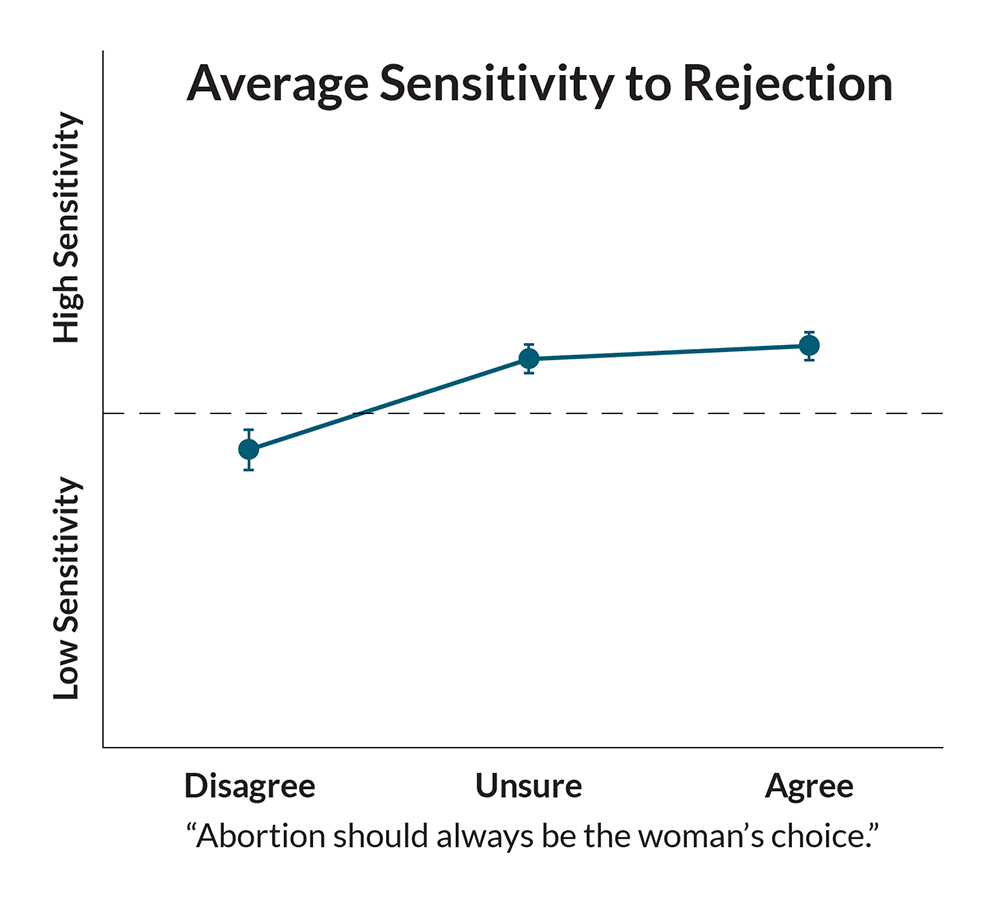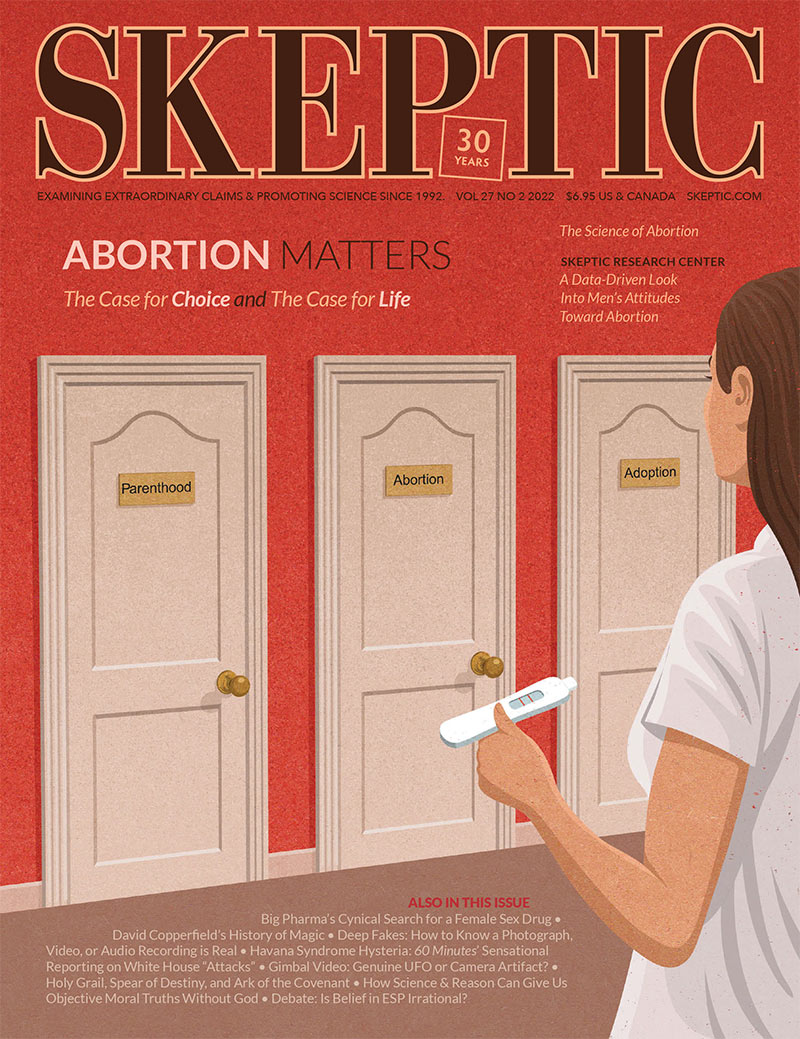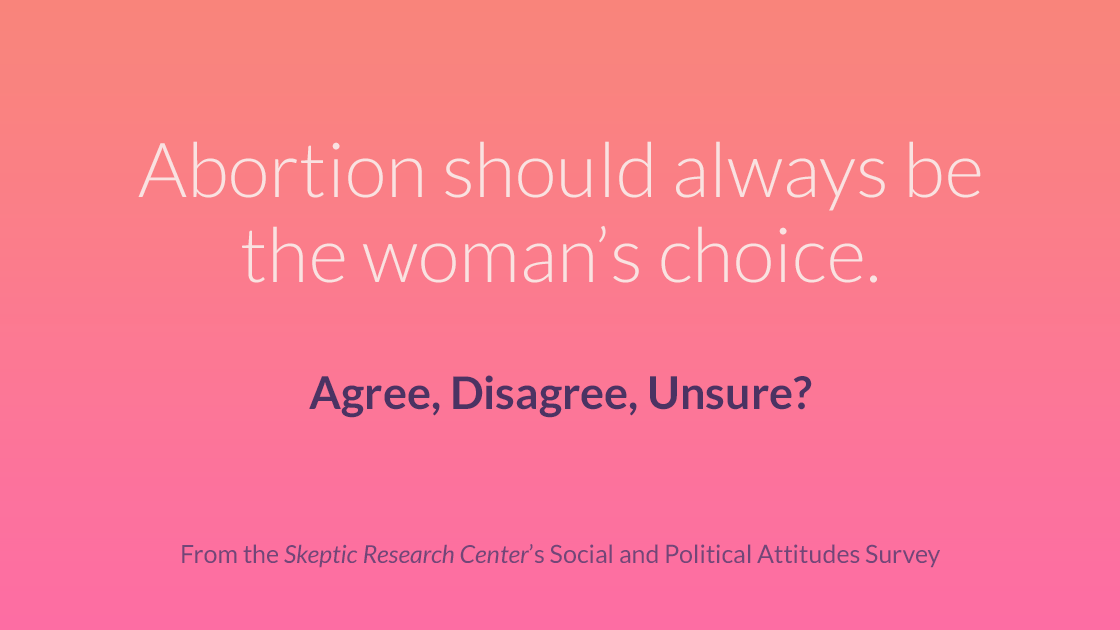Although abortion is often framed as a women’s issue, men make up half of the electorate and are more often pro-life.1 The legislative branch of the U.S. government is predominantly male: there are currently 125 women serving in the House (28.7 percent) and 24 in the Senate (24 percent),2 and five of the nine justices serving on the Supreme Court of the United States are men, four are women. So, understanding the correlates of men’s support for—or opposition to—abortion is certainly worthwhile, though often overlooked in the public discourse. Scientists collaborating with the Skeptic Research Center are not medical doctors or experts in embryology. We cannot begin to adjudicate the tense and important debate about abortion, but as social scientists we hope to shed light on some under-reported findings that may help the public and policymakers better understand this complex issue.
The stakes here are undeniably high. Depending on which side of the debate one takes, either women’s bodily autonomy or acts of murder hang in the balance. To find some empirical ground on which to make a firm decision, activists debate the degree of humanness inherent in embryos and fetuses. Pro-choice advocates insist that embryos in early stages of development are not consciously aware, whereas pro-life advocates maintain that a measurable heartbeat early in development is a sign of life.
In short, on the typically Republican pro-life side, advocates maintain that abortion is an act of violence—murder—carried out on a (developing) human being. They argue that once a human being is developing in a woman’s womb it ought to be considered legally independent of her and therefore has its own rights to be protected from harm.
On the typically Democrat pro-choice side, advocates maintain that whether or not to have an abortion is a medical decision to be made by the mother and that, absent safe access to abortion, many women would be forced to resort to dangerous and unregulated methods to end their pregnancies. They make the counterargument that women’s ability to pursue long-term educational and career goals would be compromised if control over their reproductive decisions were unduly regulated.
To help advance the national discussion on abortion attitudes, we report here on attitudes toward abortion along two dimensions often left out of studies on this topic: the degree of inequality one perceives in society and one’s sensitivity to social rejection. We measured both respondents’ perceived level of inequality and their social rejection sensitivity using established index measures developed in prior research.
The data for this brief inquiry came from the Skeptic Research Center’s Social and Political Attitudes Survey. This survey was conducted in October 2019 and included a nationally representative sample of 731 adults. After narrowing the sample to include only men, our remaining pool for analysis included 360 people. These men were roughly evenly distributed based on their political orientation: 28.6 percent identified as “liberal,” 36.6 percent as “conservative” and 34.7 percent as “moderate,” and were an average age of 48 years. Nearly half (46.9 percent) of our sample had obtained a bachelor’s degree or higher and the median household (not individual) income for the sample ranged between $75,000–$99,999. Relative to national averages, our final sample of men is less formally educated3 but slightly higher in household income.4 See our supplemental materials for more information about our sample and measures.5

Figure 1: All three groups were different from each other at p < .01. The relationship between perceptions of inequality and abortion attitudes was small-to-medium based on interpretation conventions. Error bars in figures represent standard error.
We found a significant effect for inequality perceptions, such that men who perceived society as containing greater amounts of inequality expressed stronger agreement that abortion should always be a woman’s choice (Figure 1 above). We were also able to detect a small but statistically significant effect of rejection sensitivity on men’s attitudes toward abortion. Men who reported higher levels of sensitivity to social rejection were also more likely to believe that abortion should always be a woman’s choice (Figure 2 below).

Figure 2: The “disagree” group was different from the other two groups at p < .01. The relationship between sensitivity to rejection and abortion attitudes is small based on interpretation conventions. Error bars in figures represent standard error.

This article appeared in Skeptic magazine 27.2
Buy print edition
Buy digital edition
Subscribe to print edition
Subscribe to digital edition
Download our app
While not drawing any broad conclusions from these results, we do offer the analysis as a means for stimulating further research and discussion. The data indicate that men’s attitudes about abortion are related, in part, to their general perception of social inequality, not just as regards “women’s issues.” Attitudes about abortion, then, may be one node in a nexus of political attitudes oriented toward reducing perceived levels of inequality in society. The finding regarding rejection sensitivity, though small, was also intriguing. One possibility is that men, fearing romantic rejection from women, tend to conform their political attitudes to be in line with what they think the “typical” woman around them would prefer. Another possibility is that pro-choice attitudes are now more prevalent than are pro-life attitudes—in general, amongst most people—conferring a social “normativity” to the former over the latter (though data indicate that attitudes are fairly evenly split1). If this is the case, those men who are more rejection-sensitive may be conforming to what they perceive to be general societal consensus. ![]()
About the Authors
Dr. Kevin McCaffree has a PhD in sociology from the University of California, Riverside. He is an assistant professor at the University of North Texas and co-directs the Worldview Foundations Research Team.
Dr. Anondah Saide has a PhD in psychology from the University of California, Riverside. She is a visiting assistant professor at the University of North Texas and co-directs the Worldview Foundations Research Team.
References
- https://bit.ly/36hdxzz
- https://bit.ly/3Lv2Atd
- https://bit.ly/3D6IZfM
- https://bit.ly/3qxlE1H
- https://bit.ly/36ino8j
This article was published on August 9, 2022.















